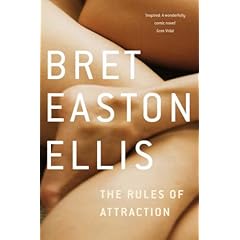 -The blurb--
-The blurb--"In "The Rules of Attraction", Bret Easton Ellis trains his incisive gaze on the kids at self-consciously bohemian Camden College, a small, affluent liberal-arts college in New England at the height of the Reagan 80s. He treats their sexual posturings and agonies with a mixture of acrid hilarity and compassion while exposing the moral vacuum at the centre of their lives. Racing from Thirsty Thursday Happy Hours to Dressed To Get Screwed parties to drinks at The Edge of the World, this is a poignant take on the death of romance."
from www.amazon.co.uk
--The review--
The growing popularity in the UK of TV programme Skins perhaps indicates how far young people's perceptions of social interaction, and particularly relationships and romance, are shifting and have shifted. However, the writers of Skins were not the first to go there, for before them was Bret Easton Ellis, whose novel The Rules of Attraction was released in 1987 (and subsequently made into a film in 2002). He too portrays a colder, more ruthless face to teenage relationships, dispensing with the lovey dovey and focusing instead on what some might deem an unrealistic version of university life, comprising little other than sex, drugs, and changing degree courses.
And yet I liked it more than Skins; I liked it more than Alan Hollinghurst's Booker Prize-winning The Line of Beauty, which, to be honest, was more of the same (go to a party...do some coke...have some sex...do some more coke...oh, wait, there's another party over there...); and this definitely appealed to me more than Ellis' arguably most famous work, American Psycho (which, given its gratuitous displays of violence, I am unlikely to ever read, seeing as even the merest hint of blood on Casualty makes me reach for a bucket). What gave the novel its compelling aspect was not initially clear; it was difficult to relate to the two-dimensional characters and at times I couldn't help feeling that I was, in fact, just reading a script for an episode of that show.
However, at some point something changed; read it less literally and as more of a satire, and the purpose of the novel becomes much more apparent. There are some really human, tender moments (I preferred the characters at these moments to when they're just randomly sleeping around), there are some killer one-liners that make the novel really acerbic and funny, and the novel is cleverly cyclical, being structured in such a way that the novel's beginning sentence follows on almost seamlessly from its final line. Equally clever is how the novel's title is shown to us, without it actually being explicitly mentioned: Ellis arguably uses the novel to state that there are in fact no rules of attraction at all.
While this wasn't the best novel I've ever read in terms of subject matter, it paints a snapshot of time culturally as well as satirising human relationships in a really skilful way, and has served as an initial hook onto Ellis' writing style (which, admittedly, does take a little getting used to). Next up for me, perhaps, will be Glamorama, which should at least have the advantage of dealing with a world with which I am slightly more familiar. Ellis is an unusual writer who deserves to be known for more than just American Psycho; described as being a writer who is sympathetic to the fate of his own 'lost generation' in a way that only Fitzgerald was about his, the sequel to Less Than Zero, due out next year, is surely justly awaited by his devotees.
Other works by Bret Easton Ellis
Imperial Bedrooms (sequel to Less Than Zero; due May 2010)
Lunar Park (2005)
Glamorama (1998)
The Informers (a collection of linked short stories; 1994)
American Psycho (1991)
Less Than Zero (1985)





No comments:
Post a Comment